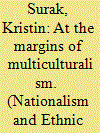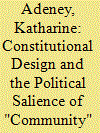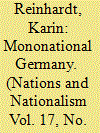| Srl | Item |
| 1 |
ID:
153601


|
|
|
|
|
| Summary/Abstract |
Will Kymlicka's theories of multiculturalism have gained wide interest in the West but only recently have been applied beyond it. This research note assesses whether a Kymlickian approach provides traction for grasping the configuration of nondominant ethnic groupings in Japan and how they have achieved a degree of multicultural recognition. It first identifies equivalents and exceptions within the Japanese case to Kymlicka's key groupings: national minorities, indigenous peoples, immigrants, and metics. It then shows that of these, the last two drove the expansion of multicultural rights. Finally, it examines why they launched claims within a multicultural framework and assess the limits of the multicultural claims for bolstering the rights of subordinate groups.
|
|
|
|
|
|
|
|
|
|
|
|
|
|
|
|
| 2 |
ID:
083647


|
|
|
|
|
| Publication |
2008.
|
| Summary/Abstract |
After the defeat of the Taliban, Afghanistan entered a period of constitutional flux. The 2004 Constitution rejected formal ethnic representation in state institutions. This Constitution, therefore, provides no defense against perceived or actual domination of the state by any one particular ethnic community. This could lead to increased ethnic resentment and conflicts.
|
|
|
|
|
|
|
|
|
|
|
|
|
|
|
|
| 3 |
ID:
078564


|
|
|
|
|
| Publication |
2007.
|
| Summary/Abstract |
Both Will Kymlicka (1995) and David Miller (1995) have defended the value of national self-determination and have argued that a properly organised self-determining nation respects rather than undermines the equal treatment of all of its members, including ethnic, religious and cultural minorities. I argue that their respective attempts to defend national self-determination and the equal treatment of all members of the nation are saddled with a serious tension. It is actually quite difficult to coherently argue both that (a) national self-determination fulfils ethically valuable ends, and that (b) a self-determining nation can treat all members equally. The equality-respecting requirement is in tension with the claim that nations secure ethically valuable goods for their members
|
|
|
|
|
|
|
|
|
|
|
|
|
|
|
|
| 4 |
ID:
107274


|
|
|
|
|
| Publication |
2011.
|
| Summary/Abstract |
This article presents a critique of Will Kymlicka's theory of multiculturalism. It examines Kymlicka's theoretical distinction between mononational and multinational states and his empirical examples that support this theory: Germany as an example of a mononational state and Switzerland as an example of a multinational state. By means of a content analysis of constitutions, it demonstrates that Danes and Sorbs should be characterised as national minorities in Germany, whereas the French- and Italian-speaking communities of Switzerland do not constitute nations. The distinction between mono- and multinational states proposed by Kymlicka does not hold for Germany and Switzerland, and hence must be approached anew, theoretically as well as empirically.
|
|
|
|
|
|
|
|
|
|
|
|
|
|
|
|